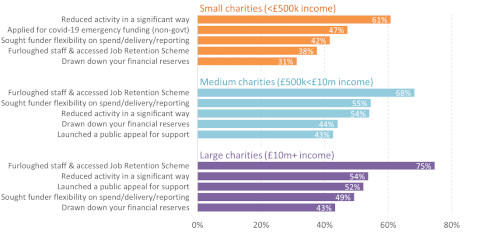Surveys. There are a lot of them about right now. With time at a premium for many of us working in the social sector, filling in yet another questionnaire doesn’t always feel like a priority. But understanding what’s going on in charities, voluntary groups and civil society organisations at this time of crisis is important. Communicating that understanding beyond the sector itself is even more crucial.
The headline numbers help to shine a light on the pressure being felt, supporting the case with government and funders for more assistance. But such research can also let us pick out the variation and nuance that exists across different parts of civil society, highlighting the issues that can get missed when focusing on the bigger picture. And the current proliferation of surveys can also help us monitor change over time – a significant consideration when the nature of the crisis is so uncertain and the timescale for recovery so indeterminate.
The weekly survey Pro Bono Economics has been running in conjunction with Civil Society Media is certainly proving illuminating. Last week’s iteration contained some unsurprising but important findings: like the fact that nine-in-ten civil society organisations expect Covid-19 to have a negative effect on their ability to meet their objectives over the coming six months.
It provided some more revealing findings too: with two-in-five becoming more pessimistic in their outlook over the past week (a week in which the government announced an extension of its Job Retention Scheme and some modifications to England’s lockdown rules), suggesting that for many organisations the challenges posed by Covid-19 are growing greater over time.
Surprises
And it threw up some outright surprises: finding that just one-in-ten organisations think it “likely” that the financial challenges posed by the pandemic will result in their having to shut down within the next six months. That’s a much lower figure than has been recorded in some other surveys, but one that is depressing nonetheless.
Such is the scale of the current crisis that the idea that ‘just’ one-in-ten organisations might disappear can be thought of as good news. Tracking this particular figure week-by-week over the coming months should allow us to better understand – and communicate – the changing financial fallout from the crisis for charities and others.
The survey also highlights some interesting differences (and similarities) across organisations of different size. Small (annual income of less than £500,000), mid-sized (income of £500,000 to £10m) and large (income of £10m and more) charities are all equally likely to say that they are being affected by the crisis – it truly is something that has affected all parts of the sector. But the nature of the challenge and the reactions recorded have varied.
For instance, when asked to name the Covid-19 issue most affecting them right now, small organisations had a clear front runner, with 42% saying it was the effect social distancing rules were having on their ability to deliver services – easily ahead of the 28% who pointed to the effect on fundraising opportunities. Among large charities however, the lead was shared, with both service delivery and fundraising concerns scoring 34%. A good reminder that the stories we tell about the strains being felt in the sector right now will likely be ringing true to different degrees from organisation to organisation.
How charities are responding
In terms of how charities are responding, there is again no real difference at the headline level: nearly all organisations have taken some form of action over recent weeks, irrespective of size. But the nature of the response has differed quite significantly, as the chart below shows.

Smaller organisations appear to have been less able than others to date to access government financial support: just 38% say they have furloughed staff, compared with 75% of large charities. They also appear to have less financial room for manoeuvre: 31% have drawn down on their financial reserves, compared with 43% of large charities. In the absence of such sources of resilience, the primary response of smaller organisations has instead been to cut back on their activity.
Perhaps unsurprisingly then, the proportion of small charities who say they think it is “likely” that they will cease to operate within six months stands at 16% – 50% up on the survey’s headline 10% figure.
Look beyond the numbers, and there is even more nuance to be found in the survey responses. Asked to add general comments about their recent experiences and messages and suggestions for government and funders, respondents haven’t held back. Following three waves of the survey, we’ve had 450 comments – many of them very detailed. They serve as a powerful reminder of the diversity of the sector, with response after response explaining the way in which their particular activity has been overlooked in the public debate.
And one message above all comes through: that demand for civil society services is rising at the very same time as the capacity of the sector is being severely squeezed. Amid uncertainty over what comes next and with a financial response from the government that has fallen well short of the sector’s needs, the tragedy of that imbalance is a message that bears repeating.
Like civil society, the value of good data is being recognised now in the way that it should have been long before the pandemic struck – experts are back in vogue. Navigating our way through the crisis, and hopefully plotting a path back to something better than ‘normal’, means no longer taking these forces for good for granted. Filling in surveys might feel like a second order priority right now, but civil society organisations need to tell their story. And they need to be heard.
Matt Whittaker is chief executive of Pro Bono Economics
The weekly survey run in conjunction with Civil Society Media is open every Tuesday and Wednesday. The survey questions and results from each week can be accessed on the Pro Bono Economics website.
Related articles












